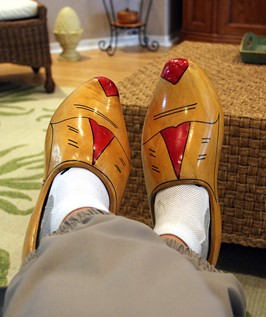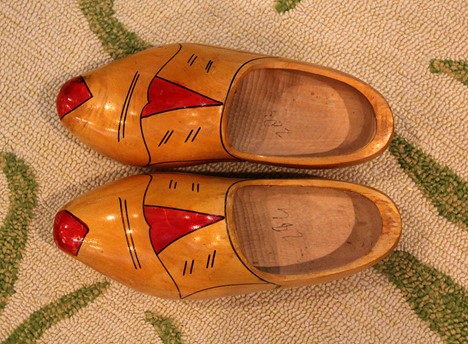


The Platte River and Wooden Shoes
by Howard Eskildsen
A river named Platte: the name means flat, something that you do not want your soda, tires, or beer to be. Its course along the featureless Nebraska plains inspired James Michener to refer to it as a no-name river in a no-name state. Most people who travel beside it on the I-80 corridor view it as a place to be passed as quickly as possible on their way to somewhere, anywhere else. To me, however, it was the center of the universe; everything I loved was there or glowing overhead in a starry sky. But the river also held surprises that would eventually connect us to far parts of the earth and a pair of wooden shoes.
Never navigable, except at times by canoe or kayak, its course was marked by sandy, braided channels which meandered over a mile-wide bed which in spring after heavy rain and thaws could rage with dark muddy waters for weeks before returning to the normal trickling braids. Pioneers in route to Oregon or California referred to it alternately as “a mile wide and an inch deep”, or as “too thin to plow, too thick to drink.”
By the early 1960’s, dams along the river had all but controlled the flow of the spring runoff and most of the old riverbed was a mix of cottonwood forest and thickets of brush and wild roses that changed now and then with the meanderings of the remaining channels. Willows lined isolated oxbows of ever-shrinking ponds full of frogs, turtles, small fish, and clams. Coyotes, raccoons, opossums, rabbits, muskrats and even a few beavers crept about, watched warily by deer from the thickets. At night, it became a cacophony of chirps, croaking, and howling which set the backdrop for a stellar view of the heavens. Stars seemed almost close enough to touch as they fanned out from the deepest regions of the glowing milky way. This was my mile-wide, forested adventure land that abutted the farm on which I was raised.
My dad, Ken Eskildsen, had envisioned this area as an oasis for travelers seeing some solitude and rest on their way to wherever. When Interstate 80 was constructed through our farm near Lexington around 1962, they scooped up sand and gravel with great earthmovers just inside the banks of the old riverbed and left behind a pond, or bar pit as it was called, that was 300 feet wide and 1200 feet long and was ideal for fishing, swimming and canoeing. By the lake and in surrounding woods, dad developed some primitive camping areas, a small trout farm, and even a 9-hole sand-green golf course. A large sign by the interstate enticed travelers to stop by, and a few did.
One summer day a colorful couple arrived who asked to camp at our site. They were from Holland and were nearing then end of their American holiday. After traveling extensively across the US, they were on their way to New York to catch a cruise ship back to Europe. They intended to stay one night and then move on the next day. They set up camp in a grassy clearing by the trout stream and took in the surroundings. The next morning they asked dad if they could stay a few more days to enjoy the river, the pond and the solitude. They stayed nearly a week before they had to leave to catch the ship, and we shared several meals and stories with them.
When it came time to leave, dad declined any payment for use of the campground since the whole family had enjoyed their company so much. Before they left they insisted in providing him with a pair of wooden shoes on their return to Holland as a thank-you gift. Dad had recalled members of his family in the Danish community in Hampton, Nebraska, wearing such footwear when he was a boy and was delighted. He gave them his shoe size and before they left, and then they motored away over the gravel roads that returned them to the interstate highway.
The days turned to weeks and the leaves of summer fell from the trees and crunched under my feet as I strolled through the empty camping area. Vines of “bittersweet” burst with berries of brilliant red and orange, to be gathered for Thanksgiving and Christmas decoration. One day I came home from school and dad said: Look what came in the mail!” He was wearing tan-colored wooden shoes with red hand-painted accents that fit him perfectly. They were accompanied by a kind note from our guests thanking him for the stay and for the happy memories.
As I grew up, I grew into the shoes as well, a perfect fit just like my dad. Eventually they were given to me, but they were too precious to wear regularly and risk breaking or wearing out. Instead, they have been kept on display ever since as a special reminder of times and of a father now passed. For a while we received an occasional card from the Dutch couple, and though they never returned, the shoes were a reminder that for them as well as for us, Nebraska’s Platte River would never be a “no-name river in the middle of a no-name state.”